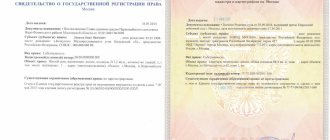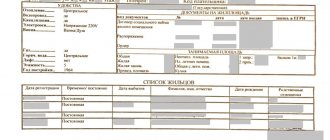Article updated: March 25, 2021
Alexey BessonovPracticing Moscow lawyer
Hello. I am a visiting lawyer from the Bessonov and Partners law firm. I specialize in discharging citizens in court.
In paragraph 1 of Art. 35 LCD and pp. 5 (f) clause 31 of Government Decree No. 713 dated July 17, 1995, it is clearly written that it is possible to discharge any person from an apartment without his consent only THROUGH THE COURT. This also applies to people who refused to participate in privatization. There is no other way.
Therefore, if, after purchasing an apartment, the previous owners and their family members refuse or ignore the requirement to check out, the current owners need to file a claim with the district court to terminate the rights to use the residential premises. You will have to go to court, even if the purchase and sale agreement contains a clause that the previous owners will sign out within a certain period of time.
○ Disadvantages of buying an apartment with persons registered in it.
Acquiring ownership of a residential premises with persons registered in it is a rather reckless act. Of course, different situations arise in life, but you should always study the situation in detail. If there are reasons to trust the former owner, then you can leave him registered for a while, since he may need this to avoid a fine for living without registration, provided for in Art. 19.15.1 Code of Administrative Offenses of the Russian Federation.
There may also be people who are not the most conscientious and can create serious problems. For example, they may refuse to move out or simply check out of the apartment. In this case, you will have to resort to legal proceedings. In addition, there are citizens whom even the court cannot discharge without their consent.
○ Legislation on discharge.
The issue of deregistration of former owners is regulated by civil law. The main provision is Part 2 of Art. 292 of the Civil Code of the Russian Federation, which establishes alienation of an apartment as the basis for termination of the right to reside in an apartment.
- Part 2 of Article 292 of the Civil Code of the Russian Federation:
- “The transfer of ownership of a residential building or apartment to another person is the basis for termination of the right to use residential premises by family members of the previous owner, unless otherwise provided by law.”
Problems arise relatively rarely with the discharge of the former owner. According to Part 1 of Art. 235 of the Civil Code, the right of ownership, which includes, in addition to possession and disposal, the right to use, is lost after its alienation. Since the transaction is carried out by the owner, he has very little opportunity to evade the statement. If family members of the former owner continue to be registered, Art. 304 of the Civil Code of the Russian Federation, which guarantees the new owner of a residential premises the right to eliminate various types of violations, even if they do not relate to the direct ownership of the property.
Additionally, in a number of special cases, the provisions of the Housing Code of the Russian Federation, the Introductory Law to the Housing Code of the Russian Federation, and Resolution of the Plenum of the Supreme Court of the Russian Federation dated July 2, 2009 No. 14 may be applied. Most often, the need for this arises when it is necessary to deregister citizens who have the right of lifelong residence. If it is still possible to file a claim in court, then subsection II of the Code of Civil Procedure of the Russian Federation and Art. 333.19 of the Tax Code of the Russian Federation regarding determining the amount of state duty.
Stage No. 3 - We register the defendants at the passport office
First you should wait until the court decision comes into force - Art. 210 Code of Civil Procedure of the Russian Federation. For what? So that the defendants have time to try to challenge the decision, i.e. file an appeal to a higher court - Art. 320 Code of Civil Procedure of the Russian Federation.
How long should I wait? In-person decision - if the defendants do not file an appeal, it will come into force in a month (clause 1 of Article 209 and Article 321 of the Code of Civil Procedure of the Russian Federation). The month must be counted from the date of the final court decision. The date is indicated in the court decision itself. For example, “The reasoned decision was made on November 5, 2021” or “The decision in reasoned form was made on November 5, 2019.” This means it will come into force on December 5, 2021.
The decision in absentia is different - it comes into force 7 days after the defendants received it but did not appeal - clause 1 of Art. 244 and paragraph 1 of Art. 237 Code of Civil Procedure of the Russian Federation. That is, the court will send a default judgment to the defendants by mail (at their place of registration). If they do not receive it, then it comes into force 1 month and 10 days after it is issued in final form - paragraph 14 of the Review of Judicial Practice of the Supreme Court No. 2 (2015) of June 26, 2015. It's better to wait 1.5 months.
When the court decision comes into force, the plaintiffs need to make a copy of it and bring it to the passport office. As a result, the plaintiffs need to receive a certificate of registered persons, in which the defendants will no longer be on the list of registered persons.
The court itself will send a copy of the decision to the regional migration department under the Ministry of Internal Affairs (formerly the Federal Migration Service), i.e. there is no need to go to them.
○ Voluntary discharge.
The ideal solution to problems with registration of former owners and family members in an apartment is voluntary deregistration. Citizens agree to be deregistered and, together with the owner, go to the territorial body of the Ministry of Internal Affairs (formerly the Federal Migration Service). The simplest situation is that the seller of the apartment independently checks out the family members and himself. To do this, he simply must write an application in the established form, attach to it copies of his passport and a certificate of state registration of the right to housing (extract from the Unified State Register of Real Estate). Persons being discharged must also be present to confirm their consent.
After the sale, no one prohibits you from checking out either. Former owners carry out a similar procedure, except for situations where they themselves cannot do this for objective reasons. In this case, they must write a permission for deregistration, notarize it and hand it over to the new owner, who takes this document to the Ministry of Internal Affairs along with an application and a copy of the passport. He also needs to take either an extract from the Unified State Register of Real Estate, or a purchase and sale agreement, which bears the seal of Rosreestr on the state registration of the right to the premises.
Statement of claim
To properly draft a claim, it is best to contact a qualified lawyer. He will not only help you fill out this document correctly, but will also advise you on all the questions that arise in your specific situation. Such services require additional costs, and not everyone has the opportunity to use them. Therefore, you can try to draw up a statement yourself. It is filled out in accordance with a specific form. The header of the application states:
- Full name of the judicial authority to which the appeal is made.
- Last name, first name and patronymic of the plaintiff and his residential address.
- Information about the defendant in the same form as about the plaintiff.
Below in the text of the application, the circumstances in connection with which the applicant is applying to the court should be indicated. Then describe the reasons for the discharge procedure. The next step is to outline all the requirements that, in the plaintiff’s opinion, the court must satisfy and list all the attached documents. At the end of the claim it is necessary to put the date of preparation and the personal signature of the applicant.
You can find a sample statement of claim to recognize a person as having lost the right to use an apartment here
○ Extract through the court.
Unfortunately, the situation can be completely opposite. But without the consent of the citizen, you can still write it out. First, to do this, you need to check whether he belongs to one of the categories that are granted the right of lifelong residence. If everything is in order, you need to collect a package of documents that are brought to court. These should be included.
- Statement of claim . The application is drawn up in free written form, but its content must strictly comply with the requirements of Part 2, Part 4 of Art. 131 Code of Civil Procedure of the Russian Federation. Citizens who are familiar with legal language can draw it up themselves, but if they are unable to competently draw up documents of this type, they should turn to legal advisers or simply familiar lawyers.
- A copy of an identity document . You must always have your passport with you when going to court, because without it you are simply not allowed into the building. However, copies of pages with information about your identity and place of residence must also be attached to the statement of claim.
- A copy of the document certifying the ownership of the residential premises . According to part 1, 2 art. 28 Federal Law 07/13/2015 No. 218-FZ “On State Registration of Real Estate”, these are an extract from the Unified State Register (former Unified State Register) or the registration inscription of Rosreestr on the title agreement.
- A copy of the receipt for payment of the state duty . According to clause 3, part 1, art. 333.19 of the Tax Code of the Russian Federation, the amount of the duty in this case is 300 rubles.
- Extract from the house register . It certifies the presence of citizens living in the apartment.
The dispute is resolved in district courts. You can file a claim only after the transfer of ownership and confirmation of its state registration in the Unified State Register of Real Estate. The case is considered within 2 months from the date of filing the application (Part 1 of Article 154 of the Code of Civil Procedure of the Russian Federation), during which the former owner or members of his family have the right to reside in the disputed premises. Only after receiving a copy of the court decision can you go to the territorial body of the Ministry of Internal Affairs and submit an application for the discharge of the relevant citizen.
○ When it is impossible to write out registered persons.
The most serious problem when purchasing an apartment with persons registered in it may be the presence of citizens whom the new owner does not have the right to discharge. This category includes:
- Former family members living in a privatized apartment, if they refused privatization, but initially had the right to do so (Article 19 of the Federal Law of December 29, 2004 No. 189-FZ “On the entry into force of the Housing Code of the Russian Federation”).
- Article 19 of the Introductory Law to the Life Fund of the Russian Federation:
- “The provisions of Part 4 of Article 31 of the Housing Code of the Russian Federation do not apply to former family members of the owner of a privatized residential premises, provided that at the time of privatization of this residential premises, these persons had equal rights to use this premises with the person who privatized it, unless otherwise provided by law or a contract."
- Persons who have the right of lifelong residence as a result of a testamentary refusal. Even if the owner of the apartment is different, the will of the testator may grant him the opportunity to be registered in the premises for the rest of his life. Only the will of the legatee is the basis for discharge from the residential premises (Part 4 of Article 1137 of the Civil Code of the Russian Federation).
- A person who has a share in a housing cooperative. If the owner of the majority of the share in an apartment has sold it to another person, the latter does not have the right to evict the other shareholder, with the exception of the full redemption of the share.
- Minor citizens living in orphanages, but having a residence permit in an apartment that they were forced to leave.
The listed categories of persons can be discharged exclusively on a voluntary basis, since in fact housing is assigned to them for life. Moreover, even the court cannot deprive them of registration.
○ How to protect yourself when purchasing.
It is possible and even necessary to prevent possible problems with the presence of registered citizens in the apartment in advance. To do this, you need to contact the passport office to obtain extracts from house books or special registration cards that contain data about persons registered in the residential premises. An additional guarantee will be the ordering of archival extracts, which will identify persons who have a lifelong right to reside in the apartment. Unfortunately, passport office employees are reluctant to issue such a certificate and most often refuse to issue it. Only a specialized legal agency dealing with real estate issues can provide assistance in this matter.
Content
1. Legislative regulation of the legal issue
2. Extract through the MFC and passport office
3. Procedure for extracting an address through the court
4. What problems may you encounter when discharged through the court?
When making purchase and sale transactions, the secondary housing market can present unpleasant surprises to the newly-made owner of an apartment. It often happens that during the turmoil with moving and paperwork, it is difficult to control the extract of the previous owner of the home.
Of course, this can be avoided when purchasing living space in a new building. The housing is put into operation after completion of construction work to the first owner. However, not everyone has the opportunity to purchase new housing. In addition, the secondary housing is already equipped and located in a comfortable area.
What options exist for deregistering the ex-owner from a purchased apartment and where to turn in case of refusal, you will find out in this article.
○ Advice from a lawyer:
✔ Is it possible to check out online?
You can check out online only using the State Services portal. However, only the citizen registered in the apartment can carry out this action voluntarily. First of all, for this you need to have a personal account on the site. If your own profile has been created, in the search bar you need to find the section “Deregistration at the place of residence” and fill out an application in the form provided, and after 3 days appear at the Ministry of Internal Affairs at the appointed time (will be indicated in the SMS notification), provide a passport and receive a departure sheet.
Deadlines
The period of time required to cancel registration when applying to the Department of Internal Affairs of the Ministry of Internal Affairs of the Russian Federation is about three days. It can be increased if a person deregisters and simultaneously registers in another home. In this case, the period increases to one month. During this time, instead of a passport, a person is issued a temporary identity card, which is valid on the territory of the Russian Federation.
The period for canceling registration through a court procedure can be from two months to six months. To this interval is also added the period for completing the procedure at the Department of Internal Affairs of the Ministry of Internal Affairs of the Russian Federation, which is 3 days.







